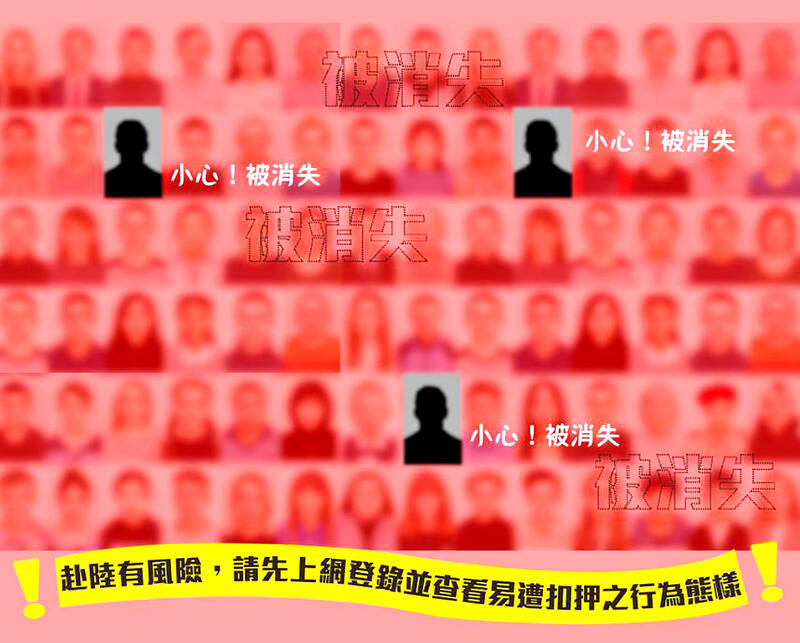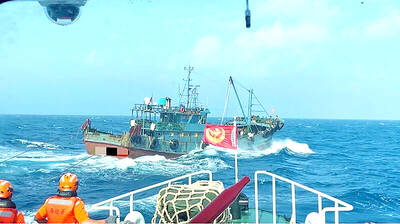The government would do everything possible to ensure the safe return of a Chinese spouse of a Taiwanese who went missing after being detained in China, Premier Chen Chien-jen (陳建仁) said yesterday.
Chen made the remarks after the Chinese-language Liberty Times (the sister paper of the Taipei Times) in an exclusive report yesterday quoted sources as saying that a person from China who has been married to a Taiwanese for more than two decades and held a Republic of China identity card was arrested in China, allegedly over her ties to groups that support President Tsai Ing-wen (蔡英文).
The detention happened during a trip to see family in August, the source was quoted as saying, adding that it is currently unknown whether Beijing is targeting Tsai supporters or that she was detained on other charges.

Photo: screen grab from the Mainland Affairs Council Facebook page
Chen yesterday told lawmakers at the legislature in Taipei that the government is aware that a large number of Taiwanese visitors to China have been detained by the authorities there in recent years.
Taiwanese who travel to China for business, education or pleasure should be vigilant about their personal safety and not hesitate to contact Taiwanese officials if they feel they or their loved ones are at risk, he said.
The government would do its utmost to protect the safety and rights of Taiwanese in China, he added.
The Mainland Affairs Council (MAC) has not yet received any petition or request for help from the missing person or members of her family, MAC Minister Chiu Tai-san (邱太三) told lawmakers during the same session.
Officials are in the process of reaching out to the Straits Exchange Foundation (SEF) and people close to the matter for clarification and confirmation, Chiu said, adding that more information would be announced if the situation has been ascertained to be true.
Separately, SEF spokeswoman Tsai Meng-chun (蔡孟君) confirmed that a naturalized Taiwanese citizen was reportedly missing in China and that a request for aid had been made by a friend.
However, the family of the missing person did not ask for help and the foundation is in the process of reaching out to people close to the matter for clarification, she said.
The MAC must do all that is necessary to ensure the safe return of the missing person if the story is true, Democratic Progressive Party Legislator Hsu Chih-chieh (許智傑) said, adding that the government should also ask the international community for help.
Beijing should release all Taiwanese nationals it is holding, including the Chinese spouse and Gusa Press (八旗文化) editor-in-chief Li Yanhe (李延賀), who was detained in China in April after returning to visit family, Hsu said.
Tunghai University political science professor Shen Yu-chung (沈有忠) said that China’s policy on Taiwanese visitors is in a state of contradiction between Beijing’s demands to expand cross-strait exchanges and increasing fear of challenges to national security.
The Chinese Communist Party (CCP) has ordered subordinate organizations in charge of dealing with Taiwan to restore and deepen bilateral ties that were disrupted by the COVID-19 pandemic, he wrote in a report to the MAC, citing the party’s 20th National Congress and other official accounts.
Concurrently, Chinese President Xi Jinping’s (習近平) efforts to secure his grip on power as president for life have been complicated by poor economic performance, adverse developments in international politics and floods in July, he said.
This has led to a ramp-up of the activities of the CCP’s security apparatus and conflict with organizations responsible for fostering ties with Taiwan due to bureaucratic compartmentalization, Hsu said.
As a result, Taiwanese who are invited by to China by the Taiwan Affairs Office could find themselves in the sights of state security apparatus, he said.
For example, Taiwanese guests of the office have been interrogated, searched or detained on multiple occasions by Chinese security officials utilizing the arbitrary powers granted to them by recent amendments to espionage laws, he said.
Such incidents have dampened the enthusiasm of Taiwanese professionals and academics to attend conferences in China, Hsu said, adding that the situation shows poor coordination between Beijing’s agencies interfacing with Taiwan and its security establishment.
Additional reporting by Chen Yu-fu

POLITICAL AGENDA: Beijing’s cross-strait Mid-Autumn Festival events are part of a ‘cultural united front’ aimed at promoting unification with Taiwan, academics said Local authorities in China have been inviting Taiwanese to participate in cross-strait Mid-Autumn Festival celebrations centered around ideals of “family and nation,” a move Taiwanese academics said politicizes the holiday to promote the idea of “one family” across the Taiwan Strait. Sources said that China’s Fujian Provincial Government is organizing about 20 cross-strait-themed events in cities including Quanzhou, Nanping, Sanming and Zhangzhou. In Zhangzhou, a festival scheduled for Wednesday is to showcase Minnan-language songs and budaixi (布袋戲) glove puppetry to highlight cultural similarities between Taiwan and the region. Elsewhere, Jiangsu Province is hosting more than 10 similar celebrations in Taizhou, Changzhou, Suzhou,

COGNITIVE WARFARE: Chinese fishing boats transmitting fake identification signals are meant to test Taiwan’s responses to different kinds of perceived incursions, a report said Chinese vessels are transmitting fake signals in Taiwan’s waters as a form of cognitive warfare, testing Taipei’s responses to various types of incursions, a report by the Institute for the Study of War said on Friday. Several Chinese fishing vessels transmitted fake automatic identification system (AIS) signals in Taiwan’s waters last month, with one mimicking a Russian warship and another impersonating a Chinese law enforcement vessel, the report said. Citing data from Starboard Maritime Intelligence, the report said that throughout August and last month, the Chinese fishing boat Minshiyu 06718 (閩獅漁06718) sailed through the Taiwan Strait while intermittently transmitting its own AIS

The Republic of China (ROC) is celebrating its 114th Double Ten National Day today, featuring military parades and a variety of performances and speeches in front of the Presidential Office in Taipei. The Taiwan Taiko Association opened the celebrations with a 100-drummer performance, including young percussionists. As per tradition, an air force Mirage 2000 fighter jet flew over the Presidential Office as a part of the performance. The Honor Guards of the ROC and its marching band also heralded in a military parade. Students from Taichung's Shin Min High School then followed with a colorful performance using floral imagery to represent Taiwan's alternate name

CHINESE INFILTRATION: Medical logistics is a lifeline during wartime and the reported CCP links of a major logistics company present a national security threat, an expert said The government would bolster its security check system to prevent China from infiltrating the nation’s medical cold chain, a national security official said yesterday. The official, who wished to stay anonymous, made the remarks after the Chinese-language magazine Mirror Media (鏡周刊) reported that Pharma Logistics (嘉里醫藥物流) is in charge of the medical logistics of about half of the nation’s major hospitals, including National Taiwan University Hospital and Taipei Veterans General Hospital. The company’s parent, Kerry TJ Logistics Co (嘉里大榮物流), is associated with the National Committee of the Chinese People’s Political Consultative Conference (CPPCC) and the Chinese People’s Liberation Army (PLA), the